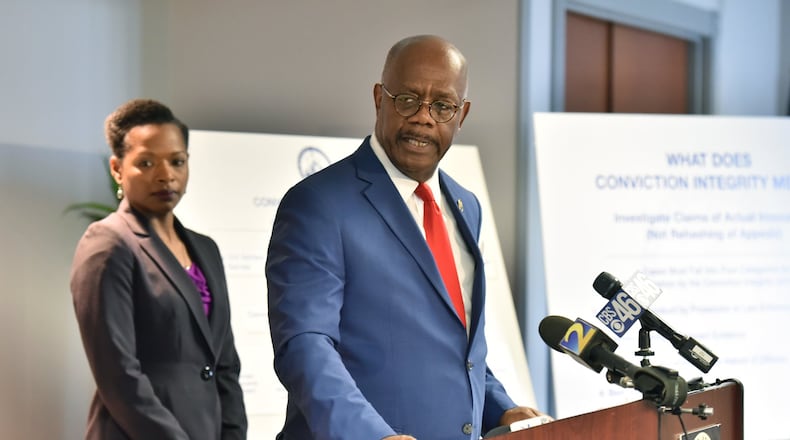They were the defendants in the most sensational murder trials in Fulton County history. Now, the cases against Wayne Williams and Leo Frank are set for a thorough review by the same office that secured their convictions.
They will be re-examined by Fulton District Attorney Paul Howard’s new Conviction Integrity Unit, an eight-member panel consisting of three Fulton prosecutors, one defense attorney, lawyers from the Georgia Innocence Project and the NAACP, a representative from the county’s faith community, and an attorney or administrator from a local college or law school.
The unit, mirrored after similar review boards nationwide, will recommend to Howard which cases merit a fresh look. The district attorney will then decide whether they should be re-adjudicated.
Williams, 60, who is serving two life sentences for the murders of two young men, has been accused for nearly four decades of being the perpetrator of the Atlanta Child Murders. Though Williams was never charged in any of the children’s deaths, 10 of their murders were introduced into evidence at his 1982 trial. Prosecutors argued there was a similar pattern to the deaths that pointed to Williams’ involvement.
“We’re going to make a broader inspection of the entire period of time,” Howard said.
Atlanta police and the GBI are also assisting in the overall effort to answer lingering questions about the case, as Mayor Keisha Lance Bottoms announced in March.
"We're going to look at all of the homicides that involved children at the same age and methods as in the Wayne Williams case," Howard said Tuesday. "We're going to collect all the forensic evidence we can and see where it leads us."
The Frank case helped inspire the creation of the new unit, he said.
RELATED:
» Authorities plan to re-test Atlanta Child Murders evidence
» 100 years later, Leo Frank lynching still resonates
Frank, a Jewish pencil factory superintendent, was sentenced to death in 1915 for raping and killing 13-year-old Mary Phagan. The verdict was based largely on the testimony of a janitor, Jim Conley, aided by anti-Semitic fervor. In 1982, a death bed confession by Alonzo Mann, a former office boy at the factory, confirmed what many thought all along. Mann said he witnessed Conley carrying Phagan’s body to the basement of the factory on the day of her death. He kept silent, he said, because Conley threatened to kill him.
Georgia’s governor at the time of the Frank trial, John Slaton, commuted Frank’s death sentence to life in prison. Soon after, a group of Cobb County civic leaders — Phagan was from there — forcibly abducted Frank from a state prison farm in Milledgeville, returned to Marietta and hanged him from an oak tree on the property of a former sheriff, William J. Frey.
Former Gov. Roy Barnes, who will serve as a consultant to the Conviction Integrity Unit, had lobbied the district attorney to re-examine Frank’s case.
At around the same time, Howard had learned of new evidence that cast doubt on the conviction, under his watch, of Frederick Gant for the 2002 murders of Jonathan Wilder and Zerious Jordan. Gant was indicted 11 years later after a neighbor, Major Smith, told police he witnessed Gant shoot the men. After Gant was sentenced to life in prison, his defense lawyer came forward with evidence that placed Smith in jail, under an alias, at the time of the murders. A new trial was ordered, without Smith’s testimony, and Gant was acquitted.
“That convergence of things … showed to me that clearly something needed to be done,” said Howard, adding that his efforts to fund the unit were denied three times by Fulton commissioners. “What we’re going to do is give up one of our regular prosecutorial positions and turn that over to this Conviction Integrity Unit.”
Asked if he’s concerned about the financial implications, through civil litigation, that could result from re-examining closed cases, Howard said, “My belief is if someone was wrongly convicted they should be compensated.”
AJC SPECIAL REPORT:
Steven Lebow, rabbi of Temple Kol Emeth in Marietta, who for years has lobbied the state to pardon Frank, expressed gratitude that his conviction is finally being reviewed.
“If you want to make the future good, you have to make the past right,” Lebow said.
Barnes said he is convinced that will happen.
"There is no doubt in my mind, and we'll prove it at the appropriate time, that Leo Frank was not guilty," Barnes said. "We can't right all wrongs. However, I think it's a bad thing if we can never admit we're wrong. This gives us a good view of history to make sure we've got it right."
According to a joint study by the University of Michigan and Michigan State University law schools and the University of California Irvine Newkirk Center for Science and Society, 33 Conviction Integrity Units had been formed nationwide through 2017. And in that time CIUs were responsible for 269 exonerations, the study found.
About the Author
The Latest
Featured




